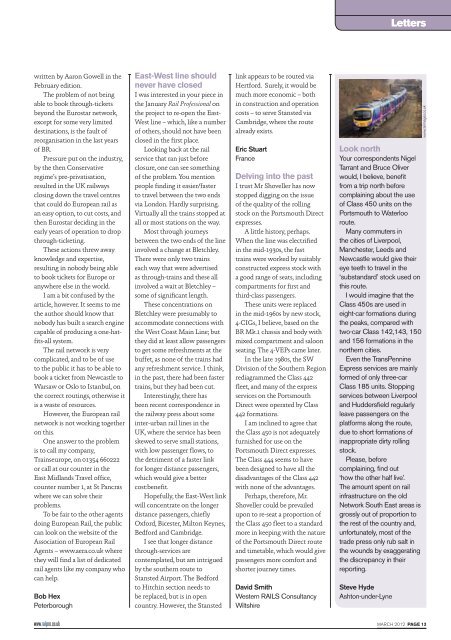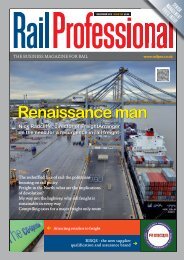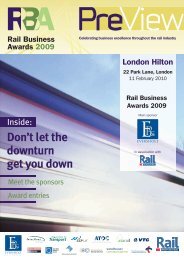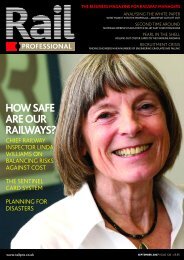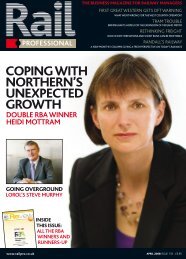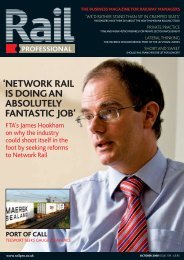View as PDF - Rail Professional
View as PDF - Rail Professional
View as PDF - Rail Professional
Create successful ePaper yourself
Turn your PDF publications into a flip-book with our unique Google optimized e-Paper software.
Letters<br />
written by Aaron Gowell in the<br />
February edition.<br />
The problem of not being<br />
able to book through-tickets<br />
beyond the Eurostar network,<br />
except for some very limited<br />
destinations, is the fault of<br />
reorganisation in the l<strong>as</strong>t years<br />
of BR.<br />
Pressure put on the industry,<br />
by the then Conservative<br />
regime’s pre-privatisation,<br />
resulted in the UK railways<br />
closing down the travel centres<br />
that could do European rail <strong>as</strong><br />
an e<strong>as</strong>y option, to cut costs, and<br />
then Eurostar deciding in the<br />
early years of operation to drop<br />
through-ticketing.<br />
These actions threw away<br />
knowledge and expertise,<br />
resulting in nobody being able<br />
to book tickets for Europe or<br />
anywhere else in the world.<br />
I am a bit confused by the<br />
article, however. It seems to me<br />
the author should know that<br />
nobody h<strong>as</strong> built a search engine<br />
capable of producing a one-hatfits-all<br />
system.<br />
The rail network is very<br />
complicated, and to be of use<br />
to the public it h<strong>as</strong> to be able to<br />
book a ticket from Newc<strong>as</strong>tle to<br />
Warsaw or Oslo to Istanbul, on<br />
the correct routings, otherwise it<br />
is a w<strong>as</strong>te of resources.<br />
However, the European rail<br />
network is not working together<br />
on this.<br />
One answer to the problem<br />
is to call my company,<br />
Trainseurope, on 01354 660222<br />
or call at our counter in the<br />
E<strong>as</strong>t Midlands Travel office,<br />
counter number 1, at St Pancr<strong>as</strong><br />
where we can solve their<br />
problems.<br />
To be fair to the other agents<br />
doing European <strong>Rail</strong>, the public<br />
can look on the website of the<br />
Association of European <strong>Rail</strong><br />
Agents – www.aera.co.uk where<br />
they will find a list of dedicated<br />
rail agents like my company who<br />
can help.<br />
Bob Hex<br />
Peterborough<br />
E<strong>as</strong>t-West line should<br />
never have closed<br />
I w<strong>as</strong> interested in your piece in<br />
the January <strong>Rail</strong> <strong>Professional</strong> on<br />
the project to re-open the E<strong>as</strong>t-<br />
West line – which, like a number<br />
of others, should not have been<br />
closed in the first place.<br />
Looking back at the rail<br />
service that ran just before<br />
closure, one can see something<br />
of the problem. You mention<br />
people finding it e<strong>as</strong>ier/f<strong>as</strong>ter<br />
to travel between the two ends<br />
via London. Hardly surprising.<br />
Virtually all the trains stopped at<br />
all or most stations on the way.<br />
Most through journeys<br />
between the two ends of the line<br />
involved a change at Bletchley.<br />
There were only two trains<br />
each way that were advertised<br />
<strong>as</strong> through-trains and these all<br />
involved a wait at Bletchley –<br />
some of significant length.<br />
These concentrations on<br />
Bletchley were presumably to<br />
accommodate connections with<br />
the West Co<strong>as</strong>t Main Line; but<br />
they did at le<strong>as</strong>t allow p<strong>as</strong>sengers<br />
to get some refreshments at the<br />
buffet, <strong>as</strong> none of the trains had<br />
any refreshment service. I think,<br />
in the p<strong>as</strong>t, there had been f<strong>as</strong>ter<br />
trains, but they had been cut.<br />
Interestingly, there h<strong>as</strong><br />
been recent correspondence in<br />
the railway press about some<br />
inter-urban rail lines in the<br />
UK, where the service h<strong>as</strong> been<br />
skewed to serve small stations,<br />
with low p<strong>as</strong>senger flows, to<br />
the detriment of a f<strong>as</strong>ter link<br />
for longer distance p<strong>as</strong>sengers,<br />
which would give a better<br />
cost:benefit.<br />
Hopefully, the E<strong>as</strong>t-West link<br />
will concentrate on the longer<br />
distance p<strong>as</strong>sengers, chiefly<br />
Oxford, Bicester, Milton Keynes,<br />
Bedford and Cambridge.<br />
I see that longer distance<br />
through-services are<br />
contemplated, but am intrigued<br />
by the southern route to<br />
Stansted Airport. The Bedford<br />
to Hitchin section needs to<br />
be replaced, but is in open<br />
country. However, the Stansted<br />
link appears to be routed via<br />
Hertford. Surely, it would be<br />
much more economic – both<br />
in construction and operation<br />
costs – to serve Stansted via<br />
Cambridge, where the route<br />
already exists.<br />
Eric Stuart<br />
France<br />
Delving into the p<strong>as</strong>t<br />
I trust Mr Shoveller h<strong>as</strong> now<br />
stopped digging on the issue<br />
of the quality of the rolling<br />
stock on the Portsmouth Direct<br />
expresses.<br />
A little history, perhaps.<br />
When the line w<strong>as</strong> electrified<br />
in the mid-1930s, the f<strong>as</strong>t<br />
trains were worked by suitably<br />
constructed express stock with<br />
a good range of seats, including<br />
compartments for first and<br />
third-cl<strong>as</strong>s p<strong>as</strong>sengers.<br />
These units were replaced<br />
in the mid-1960s by new stock,<br />
4-CIGs, I believe, b<strong>as</strong>ed on the<br />
BR Mk.1 ch<strong>as</strong>sis and body with<br />
mixed compartment and saloon<br />
seating. The 4-VEPs came later.<br />
In the late 1980s, the SW<br />
Division of the Southern Region<br />
rediagrammed the Cl<strong>as</strong>s 442<br />
fleet, and many of the express<br />
services on the Portsmouth<br />
Direct were operated by Cl<strong>as</strong>s<br />
442 formations.<br />
I am inclined to agree that<br />
the Cl<strong>as</strong>s 450 is not adequately<br />
furnished for use on the<br />
Portsmouth Direct expresses.<br />
The Cl<strong>as</strong>s 444 seems to have<br />
been designed to have all the<br />
disadvantages of the Cl<strong>as</strong>s 442<br />
with none of the advantages.<br />
Perhaps, therefore, Mr.<br />
Shoveller could be prevailed<br />
upon to re-seat a proportion of<br />
the Cl<strong>as</strong>s 450 fleet to a standard<br />
more in keeping with the nature<br />
of the Portsmouth Direct route<br />
and timetable, which would give<br />
p<strong>as</strong>sengers more comfort and<br />
shorter journey times.<br />
David Smith<br />
Western RAILS Consultancy<br />
Wiltshire<br />
Look north<br />
Your correspondents Nigel<br />
Tarrant and Bruce Oliver<br />
would, I believe, benefit<br />
from a trip north before<br />
complaining about the use<br />
of Cl<strong>as</strong>s 450 units on the<br />
Portsmouth to Waterloo<br />
route.<br />
Many commuters in<br />
the cities of Liverpool,<br />
Manchester, Leeds and<br />
Newc<strong>as</strong>tle would give their<br />
eye teeth to travel in the<br />
‘substandard’ stock used on<br />
this route.<br />
I would imagine that the<br />
Cl<strong>as</strong>s 450s are used in<br />
eight-car formations during<br />
the peaks, compared with<br />
two-car Cl<strong>as</strong>s 142,143, 150<br />
and 156 formations in the<br />
northern cities.<br />
Even the TransPennine<br />
Express services are mainly<br />
formed of only three-car<br />
Cl<strong>as</strong>s 185 units. Stopping<br />
services between Liverpool<br />
and Huddersfield regularly<br />
leave p<strong>as</strong>sengers on the<br />
platforms along the route,<br />
due to short formations of<br />
inappropriate dirty rolling<br />
stock.<br />
Ple<strong>as</strong>e, before<br />
complaining, find out<br />
‘how the other half live’.<br />
The amount spent on rail<br />
infr<strong>as</strong>tructure on the old<br />
Network South E<strong>as</strong>t are<strong>as</strong> is<br />
grossly out of proportion to<br />
the rest of the country and,<br />
unfortunately, most of the<br />
trade press only rub salt in<br />
the wounds by exaggerating<br />
the discrepancy in their<br />
reporting.<br />
Steve Hyde<br />
Ashton-under-Lyne<br />
www.railimages.co.uk<br />
March 2012 Page 13


